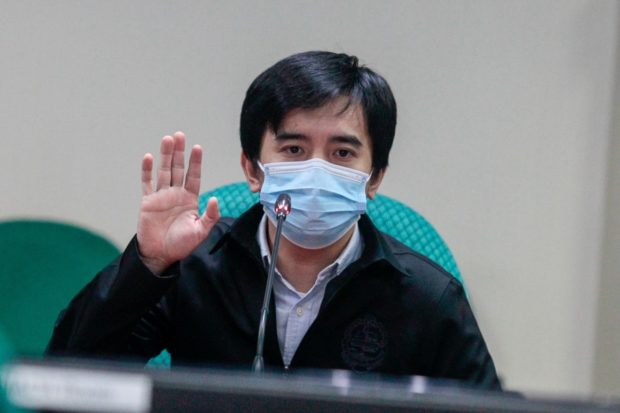
PHARMALLY OFFICIAL ATTENDS SENATE HEARING: Pharmally Pharmaceuticals Corporation Director Lincoln Ong attends the Senate Blue Ribbon Committee hearing Tuesday, October 5, 2021, on the alleged anomalies in the purchase of face masks, face shields and personal protective equipment. Ong was cited in contempt and has been held in Senate since September 21 for “being evasive.” (Photo from Voltaire F. Domingo/Senate PRIB)
MANILA, Philippines — Senate had committed grave abuse of discretion when it cited in contempt and ordered the arrest of Pharmally executives Lincoln Ong and Michael Yao Hung Ming, Supreme Court declared.
Senate previously cited Ong and Yao in contempt for allegedly giving vague and evasive answers to questions regarding Pharmally’s contract with government to purchase COVID-19 medical supplies.
In their separate petitions submitted to the High Court after the Senate probe, both said their constitutional right to due process was violated.
Ong and Yao said Senate had encroached into the contempt power of the judiciary.
They also called on SC to declare as unconstitutional the Senate rules.
SC, in its decision promulgated March 28, 2023, stated the order of arrest and contempt case against the two executives violated their rights to due process.
The SC decision was received by the parties in November.
“The Committee’s grave abuse of discretion lay in its precipitate act of citing petitioners Ong and Yang in contempt and ordering their arrests without giving them the opportunity to be heard,” SC said.
The decision took note of the observation of Senior Associate Justice Marvic Leonen, who said that “even inconsistent answers were equated by the Committee with ‘testifying evasively.'”
“Whether a witness genuinely did not know or did not recall the answer, or was evasive in answering a question is largely a matter of judgment or opinion….” it said.
“This determination requires “an assessment of the totality of the evidence presented to determine whether a witness speaks truthfully or merely trying to evade answering the question directly,” read the decision quoting Leonen’s observation.
SC Associate Justice Henry Inting wrote the resolution.
The ruling also mentioned Chief Justice Alexander Gesmundo’s point that given the broad definition of “giving false and evasive testimony,” the witnesses must at least be given a chance to explain why their testimony is not false or evasive.
While the justices agreed the right to due process of the two petitioners had been violated, SC did not agree with the petitioners’ accusation that Senate had supposedly encroached on the contempt power of the judiciary.
“The Legislative’s power of contempt is inherent and arises by implication,” said the High Tribunal.
“This coercive process is essential to the Legislature’s discharge of its functions… to legislate wisely or effectively because they have the power to compel the availability of information necessary in shaping legislation,” the verdict explained.
SC also noted Senate rules cannot be declared unconstitutional as it has complied with the requirement set under the Constitution that the rules, including its amendment, should be made known to the public through publication.
Meanwhile, Attorney Ferdinand Topacio, counsel for one of the Pharmally executives, thanked SC for “truly being the last and most steadfast bastion of justice and the rule of law in our country.”
“The decision, unanimous as it is, is a great step forward in curbing the abuses being foisted upon some resource persons who are being forced to testify in Senate proceedings in violation of their fundamental rights,” he said.